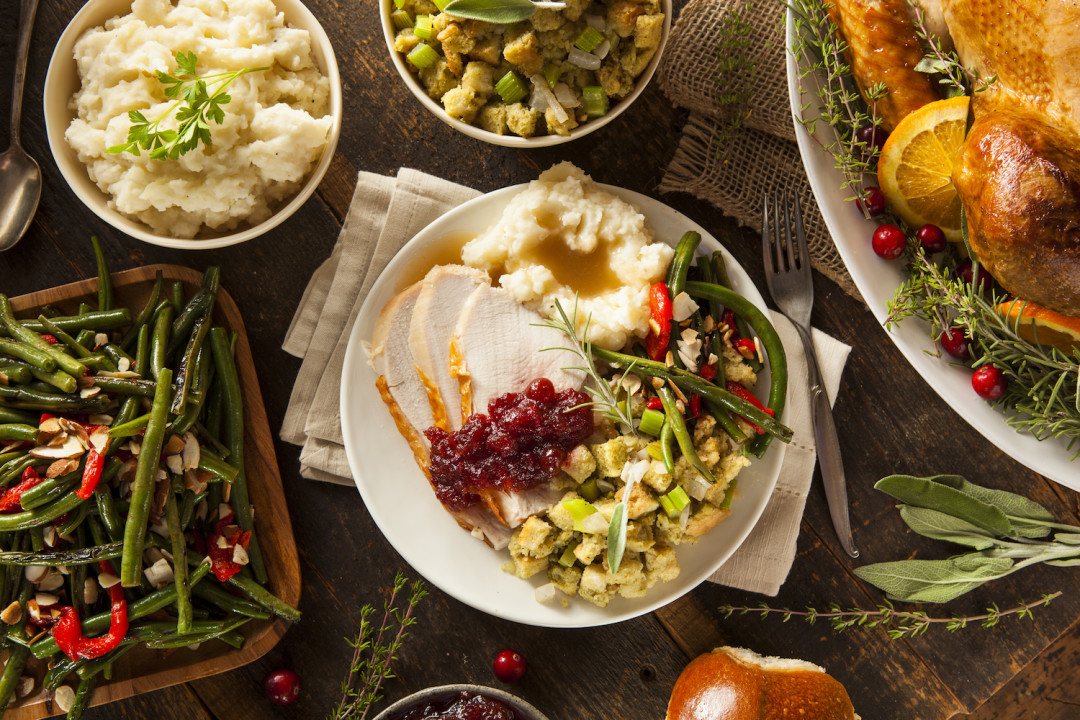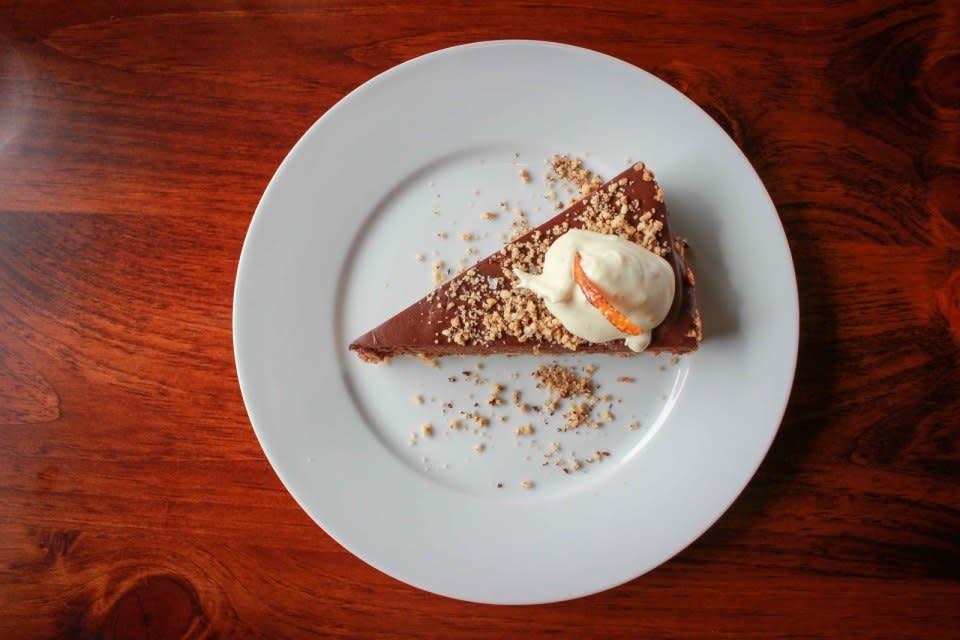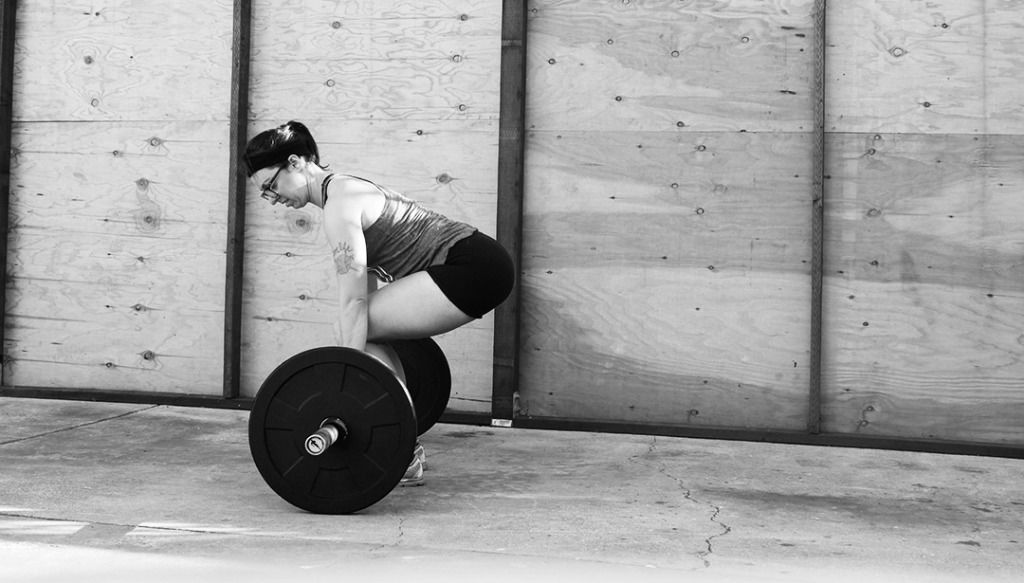10 Tips for Emotionally Surviving the Season of Holiday Feasts

Image: Shutterstock
The holiday season promises friends, family, and merry-making galore, but all that eating can also cause major anxiety—especially in folks with food allergies, eating disorders, strict diets, or body image issues. Follow these top expert tips to make your holiday feast stress-free:
1. Focus on what’s important to you.
“The holidays is a time when people tend to really dump a lot of pressure on themselves in a way that’s not necessary,” says Dr. Samantha Brody of Evergreen Natural Health Center. “Whether that’s about the way that they should eat, or meeting certain expectations that society or your family seems to have.” Instead of getting swept up by outside pressures, choose your priorities—whether that's family, health, relaxation, or something else entirely—and tune out the rest.
2. Make a plan beforehand.
“I have a fair amount of clients that are binge eaters or compulsive overeaters,” explains wellness coach Lacy Davis of Liberation Barbell. “Maybe their plan will be, ‘I’m going to eat one plate of food, and then I’ll wait 15-20 minutes to see if I want more.’ Or maybe, ‘I’m just going to eat one very full plate of food.’ Or, “I’m going to set my judgment aside for today and just try to be present.” That’s a solid plan too.”
3. Don’t let exercise detract from spending time with your people.
Missing a daily workout can cause serious anxiety in fitness fanatics and chronic exercisers, but don’t let a skipped sweat sesh overshadow friends and family. “The rule I have for myself is I give my family two days where I chill with them and focus on being with them,” says Davis. If you’re really getting restless, try including your loved ones in a fun activity. Sign the family up for a Turkey Trot, lead a group walk or hike, or challenge a friend to 100 jumping jacks or burpees.

Image: Shutterstock
4. Prepare for critical comments with affirmations.
If your family tends to criticize your body or dietary choices, it’s important to ground yourself in positivity ahead of time. As Davis explains: “Before I go into a setting where I recognize that people might be making comments that make me feel uncomfortable, I’ll write a list: I’m safe and comfortable in my body. I make choices that serve my highest good. I feel good about the food choices that I make. I’m comfortable in my skin.
“And from there, if people say, ‘Oh, there’s lots of carbs in that,’ I’ll say, ‘Carbs are energy. Carbs are what the body runs on. I like carbs…’ When people talk to me about my weight, I say, ‘That’s not my focus.’ I make it clear that I’m not interested in talking about my body, even if it’s positive.” (Bonus: these affirmations also work well if you’re your own worst critic.)
5. Communicate with friends and family.
“It’s important to be clear about what your own values are, whether that’s being vegan or staying off of gluten or not wanting to overeat,” says Dr. Samantha. If you’re a health nut dreading your family’s traditional recipes swimming with butter, cream, cheese, and mayo, you’re probably not the only one. Ask your family if they’re open to a healthy holiday meal. Similarly, if you have dietary restrictions, let everyone know ahead of time. You’d be surprised who might accommodate with gluten-free stuffing or vegetarian gravy!
6. Share food that you love.
If you’re still worried that you won’t be able to eat anything at the holiday potluck, bring a crowd-pleasing dish to share. That way, not only are you guaranteed not to starve, but anyone judging your diet will be politely silenced. By showing everyone how easy and delicious it can be to be vegan, gluten-free, or simply healthful, you’re proving that special diets don’t equal deprivation. You may even walk away with a few converts. And don’t forget dessert!

Image: Molly Woodstock
7. Fight anxiety by being helpful.
If social situations, family drama, or tureens of food make you (rightfully) nervous, try shifting your focus away from your own inner monologue. Occupy your mind by volunteering to set the table, do the dishes, or play with any pups or tykes that might be feeling neglected.
8. Don’t shame yourself for eating.
While one binge or dietary slipup may feel like the end of the world, it’s important to be gentle and kind to yourself. “People think that if they take one misstep, everything is ruined, but if you’re eating healthfully and listening to your body most of the time, you can get through Thanksgiving eating a lot without any body change,” says Davis. And by giving yourself permission to eat, you’re much less likely to go off the deep end.
9. Use those calories for a killer workout.
“I know I’m going to eat more on Thanksgiving, so on Friday after Thanksgiving, I get stoked to put that energy to use,” Davis explains. “I look at it as a positive: I’m going to use those calories and that fuel and that energy to go make gains. Especially as a strength trainer, or even as a runner, you can use those calories to have the workout of your life.”

Image: Courtesy Lacy Davis
10. Base your resolutions on bettering yourself.
If your New Years resolution focuses on fitness, think about strength, speed, or consistency. In other words, rather than “lose X pounds,” you might set a goal to run a 10K in under an hour, or deadlift 100 pounds, or eat three servings of green vegetables a day.
“Every goal you make should be about bettering yourself, and chances are, simply shrinking yourself is not going to make you feel as good as one might think,” Davis says. But if you’re dead set on losing weight, take note—speed, strength, and consistency goals are typically more effective in producing weight loss than vague “lose X pounds” resolutions, to boot.




